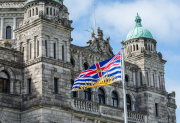By: Ian Bruce, Karen Campbell and Lisa Matthaus
When Premier Gordon Campbell announced his government's intent to go green in the recent speech from the throne, jaws could be heard dropping around the province.
Ambitious greenhouse gas reduction targets, strict California-style vehicle emission standards -- it all looked almost too good to be true.
Alas, the honeymoon was short-lived, or at least it has yet to be scheduled. In the weeks following the speech, both the B.C. budget and the new B.C. Energy Plan showed little of the forward-thinking and innovative approaches that characterized the throne speech.
These mixed messages create a real problem for investors, entrepreneurs and British Columbians in general. Where is B.C. really headed? And what priorities will guide that future?
Take, for example, oil and gas development. According to the throne speech, the province will reduce its greenhouse gas emissions by 33 per cent below today's levels -- including significant reductions in the oil and gas sector by 2016. But the energy plan shows the government's clear intention to expand the industry to new parts of the province, including vast areas of the Interior and the North. And it renews the government's commitment to open up B.C.'s coastline to oil and gas development.
All things being equal, dramatic increases in fossil fuel production lead to dramatic increases in greenhouse gas emissions. So the energy plan and the throne speech are attempting to take us in opposite directions. Unless the government enacts market-based regulations that require the oil and gas industry to reduce its fair share of emissions, B.C.'s emissions will continue to rise.
Another example of this inconsistency is in transportation. The throne speech announced vehicle tailpipe emission standards similar to those in California -- a significant improvement. Yet the government continues to go full speed ahead with its intentions to spend billions on freeway expansion and the twinning of the Port Mann Bridge in the Lower Mainland. More highways mean more cars, more pollution and more greenhouse gases, plus renewed congestion at higher traffic volumes. Again, these plans are at odds with the province's goals. To seriously reduce emissions from transportation, tailpipe standards must coincide with major improvements to our public transit system rather than expansions to our freeways.
And what about subsidies? While Victoria announced a $25-million Innovative Clean Energy Fund in the throne speech to encourage alternative energy, the B.C. budget estimates subsidies to the oil and gas industry will average $263 million per year -- a whopping 10 times the amount slated to support clean energy. These subsidies take money out of the pockets of British Columbians to help fund global warming. With oil and gas companies making record profits, isn't it time to eliminate these perverse subsidies and tax breaks?
With all these apparent contradictions between the throne speech and the major announcements since, how are British Columbians supposed to plan for the future? Are we going to continue increasing our dependence on fossil fuels, while subsidizing the industry to the tune of hundreds of millions of dollars annually? Or are we going to go beyond green rhetoric and move towards the low-carbon economy of the future?
The fact that the recent energy plan does not explicitly address climate change by credibly demonstrating through a "carbon ledger" how carbon emissions will be reduced is a serious problem.
A carbon ledger approach would measure projects and programs based on whether they contribute to or reduce global warming. To make all this work, the throne speech commitment needs to become a legislated target. This would send a clear message to all about where we're heading and on what time line.
With the throne speech, Premier Campbell has taken a big step and placed one foot through the door.
He's seen the success of jurisdictions like California, which have legislated plans to move towards a more sustainable future, but he has yet to fully embrace change and step over the threshold. Half-measures won't cut it.
Ian Bruce is a climate change specialist with the David Suzuki Foundation, Karen Campbell is staff counsel and director of B.C. policy with the Pembina Institute and Lisa Matthaus is the campaign director with the Sierra Club of Canada, B.C. Chapter.





